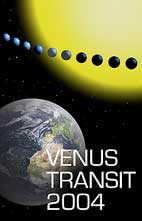
|


|
|
2004-2012: the transits of Venus
|
Observations of the transit of Venus
Where can we get observations?:
How to observe in 2012?
For a safe observation of a transit, several
possibilities are available:
-
using glasses as for the "eclipse of the Sun"
With specific glasses as used for the "eclipse of the Sun" (solar filter
with a density of 5 -glasses for welder with the same density may
be used- and of a good optical quality)
you are able to see a small black round spot slowly moving
on the disk of the Sun. Its diameter is about one minute of arc and
the high contrast on the bright disk of the Sun will allow to see it easily.
Note that such glasses do not allow to make a measurement and
to determinate exactly at what time Venus will enter on the disk
of the Sun. More, do not stay too long watching the Sun even with
protecting glasses. Even it is not dangerous, the eyes may be tired
after several minutes and the hot sun will provide you a sunburn
which may become dangerous to your health. So, be careful and don't
misused the glasses. These glasses may be found in optic stores, in
stores for astronomical material, in drugstores or near a glasses
maker.
Click here to get a list of glasses makers.
-
using an instrument for easy projection such as "Solarscope" or
"Venuscope"
This type of material is harmless and the eyes do not become tired after several
minutes of observing. It is recommended to prevent observers from the Sun,
to put them under a shadow allowing them to have a better view.
Four or five persons may observe at the same time. The determination of the contacts between
Venus and the Sun is possible. The makers of such instruments have web sites:
Light Tec
et Sobomex.
-
using an optical instrument (refracting telescope or field-glasses) in
order to project the image of the Sun on a screen.
This type of mounting needs that you have some optical knowledge. The light
coming out of the instrument is very dangerous. Auxiliary telescopes
must be taken out of the main instrument. See the
information
sheet n°24
dedicated to this technique of observation. Do not use a reflecting
telescope for projection. The concentrated heat of the Sun may
destroy the telescope.
-
using an optical instrument to watch the Sun directly.
In that case, you may use field-glasses, a refracting telescope or
a reflecting telescope providing that the filter is put in front
of your instrument, i.e. between the Sun and your instrument, never near
the eyepiece. In that case, you must remove any auxiliary telescope
mounted on your instrument for pointing.
You may see the information
sheet n°24 dedicated to this technique. The
filter to be used may be of density 5 (i.e. darkening with a factor 100 000).
The determination of the contacts is easy. You must be trained before to
appreciate to the nearest second of time an event such as a contact between
the Sun and Venus.
-
using an optical instrument in order to record the images of Venus on the
disk of the Sun (webcam, CCD camera, video camera).
As above, a refracting or reflecting telescope may be used and the
filter must be put in front of the instrument, between the Sun and the telescope.
The auxiliary pointing telescope must be taken out of the main instrument to avoid accidents.
See also the information
sheet n°24 dedicated to this technique. The filter to be used
may be of density 4 or 5 depending on the sensitivity of the detector.
A density of 4 avoids long exposures and allows to record continuouly
the motion of Venus.
The determination of the contacts is easy: it will be possible to see again the recorded
images and to determine when the contact takes place. Each
image must be dated in Universal Time with an accuracy better than one second of time.
Most of the video recorders allow to insert the timing.
|
|




